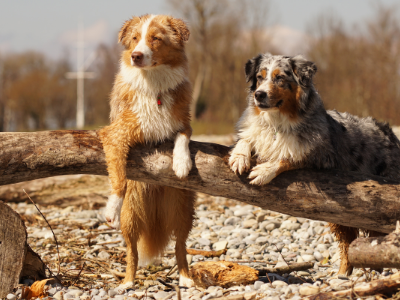Puppies and dogs undergoing intensive training need balanced dietary fats in order to learn and complete the tasks of their training. Twenty-five percent of the fat content of the brain is DHA so this fat is particularly important for enhancing intelligence and improving behavior. It has also been shown that an excess of omega 6 fatty acids can be detrimental to your pet’s brain health. Some studies have shown that excess in omega 6 fatty acids without a balance of omega 3’s can shorten attention span and undermine an animals’ ability to maintain self-control. Insufficient dietary DHA also reduces an animal’s ability to learn and remember.
If you are a dog owner with a working dog, a completely raw diet should be considered with a good balance of fats. You may see vast improvements in your progress as your train your dog for agility, tracking, obedience, or any other canine sport.
So how do we balance the fats correctly?
1. The first thing you must do is ensure that the meats that you are adding to the diet do not come from high-fat sources such as trim or other “not for human consumption” meat sources. Trim is usually extremely high in saturated fats and omega 6 fats which outweigh the omega 3 fats. This is a common mistake when pet owners are new to raw and looking for a cheaper solution to feeding their pets. Cheaper foods are NOT better for your pet or your wallet for that matter. If you fail to balance the fats in the diet and offer too much-saturated fat, you will run into difficulties down the road that may include vet bills. These could come in the form of behavioral or neurological problems, training issues, improper cell function, and many other co-factors.
2. The second thing you must look at is what types of fats to combine and in what amounts. You must balance the following:
a) Saturated vs. Unsaturated fats
In order to do this, it is important to rotate your proteins eg. ruminant meats, and poultry. Domesticated meat animals are higher in fat than that of their wild counterparts so you need to be sure that you are paying attention to the amount of fat that is in the meats you are feeding. Rotating ruminant meats and poultry will provide a better balance of saturated and unsaturated fats. We recommend a ratio of 2 poultry:1 ruminants.
b) The short-chain omega 6 and 3 fatty acids
To do this, you will need to add oils and other foods to the meat sources you use to balance the short-chain omega 3’s and 6’s. Generally, domesticated meat animals are low in linoleic acid (LA) and alpha-linolenic acid (ALA). Red (ruminant) meats are low in LA and ALA. Flaxseed oil increases the ALA but doesn’t have much LA. To increase LA, provide hemp see oil or whole hemp hearts. Most of us feed fish oils (important for balancing DHA), so you need to be aware that adding fish oil without increasing the LA in the diet can actually cause an imbalance, especially if your dog is only able to eat red meat diet for health reasons. Balancing with flax, hemp, and fish oil is important in these cases especially.
How to balance the fats for ruminant meats: 1 tsp of hempseed or walnut oil or 2 tsp of hemp seed and either ¼ of a 3.75oz can of sardines or 1-2 tsp of cold-pressed sardine oil per 1-1.25lbs of 90-93% lean red meat. Sardines also add an important arrangement of natural minerals to the diet.
To balance fats in poultry is slightly different because these animals are generally high in polyunsaturated fats, especially LA. Avoid using hemp seeds or hemp oil with poultry for this reason as it is also high in LA. You do need to add ALA here though which can be done by adding flax oil.
How to balance fats for poultry: 1 tsp of flax or chia oil and ¼ of a 3.75 oz can of sardines or 1 tsp of cold-pressed sardine oil to 1-1.25lbs of lean chicken with bone (whole, ground with the excess fat removed).
c) The long-chain omega 6 and 3 fatty acids
Eicosapentaenoic acid (EPA) and docosahexaenoic acid (DHA) are long-chain polyunsaturated fats that are essential to brain function. They need to be added as fresh as possible in order to be used correctly within the body. Refrigerate any fish/plant oils and seeds you may be using. Adding sardines will increase the EPA and DHA in the diet as well cold-pressed salmon, mackerel, and sardine oils. Avoid buying large quantities of oil at a time since most of the oils listed above are unstable and oxidize (go rancid) quickly in relation to other fats.
The rule of thumb is 0.5-1g of EPA & DHA per day for a 45lb dog.
3. Additionally, you will want to protect the beautiful balance of fats you are adding to your pet's diet by adding a vitamin E at 400IU per 30lbs of dog and other naturally occurring antioxidants from a variety of leafy green veggies and root veggies (for dogs). If you are feeding whole canned sardines, you are also adding essential minerals that will help to utilize the fats correctly once they are ingested. If you are only using fish oils, you will want to research adding a mineral supplement to ensure all mineral requirements are being met. If you are feeding a wide variety of whole bones in the diet, adding a supplement may be of less importance but please contact us for more details on your pet as an individual.
Balancing fats provide more benefits than just healthy brain function. Other benefits include skin, eye, joint and reproductive health. Don’t forget these important nutrients when you are building a raw diet for your pet!
References:
1. Unlocking the Canine Ancestral Diet by Steve Brown, Dogwise Publishing 2010
2. University of California- Los Angeles Scientists Learn How Food Affects the Brain: Omega 3 Especially Important.” (2008, July 11) Science Daily. Data available at http://www.sciencedaily.com/releases/2008/07/080709161922.htm



